Filter by
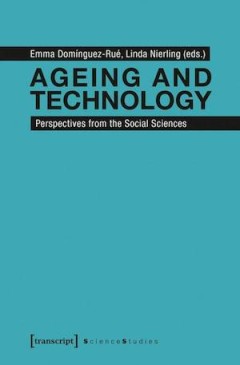
Ageing and Technology : Perspectives from the Social Sciences
The booming increase of the senior population has become a social phenomenon and a challenge to our societies, and technological advances have undoubtedly contributed to improve the lives of elderly citizens in numerous aspects. In current debates on technology, however, the »human factor« is often largely ignored. The ageing individual is rather seen as a malfunctioning machine whose def…
- Edition
- -
- ISBN/ISSN
- 9783837629576
- Collation
- -
- Series Title
- Science Studies
- Call Number
- NONE

Ageing and Covid-19 : Making Sense of a Disrupted World
This volume presents a range of research approaches to the exploration of ageing during a pandemic situation. One of the first collections of its kind, it offers an array of studies employing research methodologies that lend themselves to replication in similar contexts by those seeking to understand the effects of epidemics on older people. Thematically organised, it shows how to reconcile qua…
- Edition
- -
- ISBN/ISSN
- 9781000530971
- Collation
- -
- Series Title
- Social Perspectives on Ageing and Later Life
- Call Number
- -

Health and Wellbeing in Late Life = Perspectives and Narratives from India
This open access book takes a multidisciplinary approach to provide a holistic understanding of late old age, and situates the aged person within the context of family, caregivers, clinical and other institutions. All through the book, the author discusses preparedness for an aging individual as well as the society in the Indian context. The book highlights inevitable but mostly neglected healt…
- Edition
- 1
- ISBN/ISSN
- 9789811389382
- Collation
- XXV, 195 ill; lamp
- Series Title
- -
- Call Number
- -
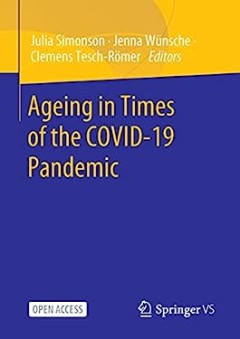
Ageing in Times of the COVID-19 Pandemic
This Open Access Book contains reports on the situation of people in the second half of life during the first year of the Covid-19 pandemic. The analyses are based on the German Ageing Survey (DEAS) and they provide insights on four main areas of life: income and work, subjective health and well-being, social support and loneliness as well as societal participation. This book is useful for s…
- Edition
- 1
- ISBN/ISSN
- 978-3-658-40487-1
- Collation
- VIII, 253
- Series Title
- -
- Call Number
- -

Aging Well : Solutions to the Most Pressing Global Challenges of Aging
This open access book outlines the challenges of supporting the health and wellbeing of older adults around the world and offers examples of solutions designed by stakeholders, healthcare providers, and public, private and nonprofit organizations in the United States. The solutions presented address challenges including: providing person-centered long-term care, making palliative care accessibl…
- Edition
- 1
- ISBN/ISSN
- 9789811321641
- Collation
- XVII, 218 hlm; ill., lamp.,
- Series Title
- -
- Call Number
- -

Fragility Fracture and Orthogeriatric Nursing
This second edition, in Open Access, aims to provide a comprehensive and practical overview of the knowledge required for the assessment and management of the older adult with or at risk of fragility fracture, with additional focus on those who are frail. It considers this from the perspectives of all the clinical and home care settings in which this group of patients receive care and is releva…
- Edition
- -
- ISBN/ISSN
- 978-3-031-33484-9
- Collation
- XX, 307
- Series Title
- -
- Call Number
- -
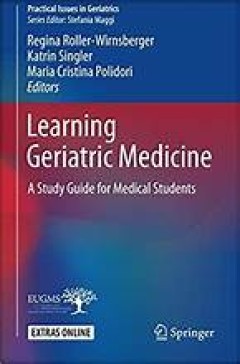
Learning Geriatric Medicine
This textbook presents hands-on training material for medical students. The style reflects the need for practice-based teaching with a modern edge in daily clinical routine; accordingly, it also employs online material and pocket cards. Each chapter begins with specific learning objectives, which are cross-referenced with the European curriculum for undergraduate medical education released by t…
- Edition
- 1
- ISBN/ISSN
- 978-3-319-61997-2
- Collation
- Kedokteran
- Series Title
- Practical Issues in Geriatrics
- Call Number
- 617
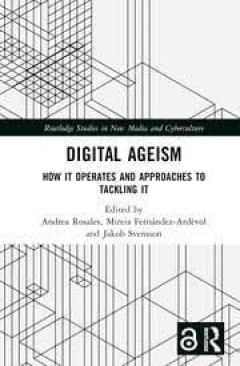
Digital Ageism How it Operates and Approaches to Tackling it
This anthology contributes to creating awareness on how digital ageism operates in relation to the widely spread symbolic representations of old and young age around digital technologies, the (lack of) representation of diverse older individuals in the design, development, and marketing of digital technologies and in the actual algorithms and datasets that constitute them. It also shows how ind…
- Edition
- -
- ISBN/ISSN
- 9781000904796
- Collation
- -
- Series Title
- -
- Call Number
- -
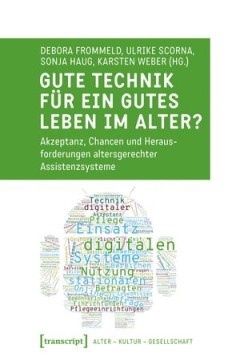
Gute Technik für ein gutes Leben im Alter?: Akzeptanz, Chancen und Herausfor…
Längst gibt es altersgerechte digitale Assistenzsysteme. Doch sind Umfang und Geschwindigkeit ihrer Verbreitung sowohl in Pflegeeinrichtungen als auch in privaten Haushalten weitgehend unbekannt. Informationen zu tatsächlich eingesetzten Systemen, realisierten Umsätzen und Marktvolumen sind kaum zu finden. Obwohl es viele Vermutungen hinsichtlich der Hindernisse bei der Einführung altersger…
- Edition
- -
- ISBN/ISSN
- 9783839454695
- Collation
- -
- Series Title
- -
- Call Number
- 301 GUT g
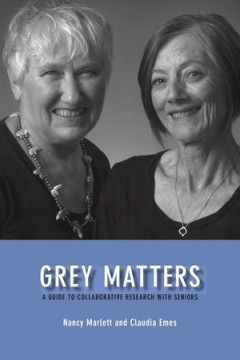
Grey Matters A Guide for Collaborative Research with Seniors
This study marks a major step in making collaboration between seniors, academic researchers, and community researchers a reality. Many aging adults are motivated to undertake research projects in later life or even return to university after retirement. Grey Matters is the result of a pilot project developed to study the effectiveness of collaborative research involving seniors. Because the pro…
- Edition
- -
- ISBN/ISSN
- 9781552385364
- Collation
- -
- Series Title
- -
- Call Number
- -
 Computer Science, Information & General Works
Computer Science, Information & General Works  Philosophy & Psychology
Philosophy & Psychology  Religion
Religion  Social Sciences
Social Sciences  Language
Language  Pure Science
Pure Science  Applied Sciences
Applied Sciences  Art & Recreation
Art & Recreation  Literature
Literature  History & Geography
History & Geography